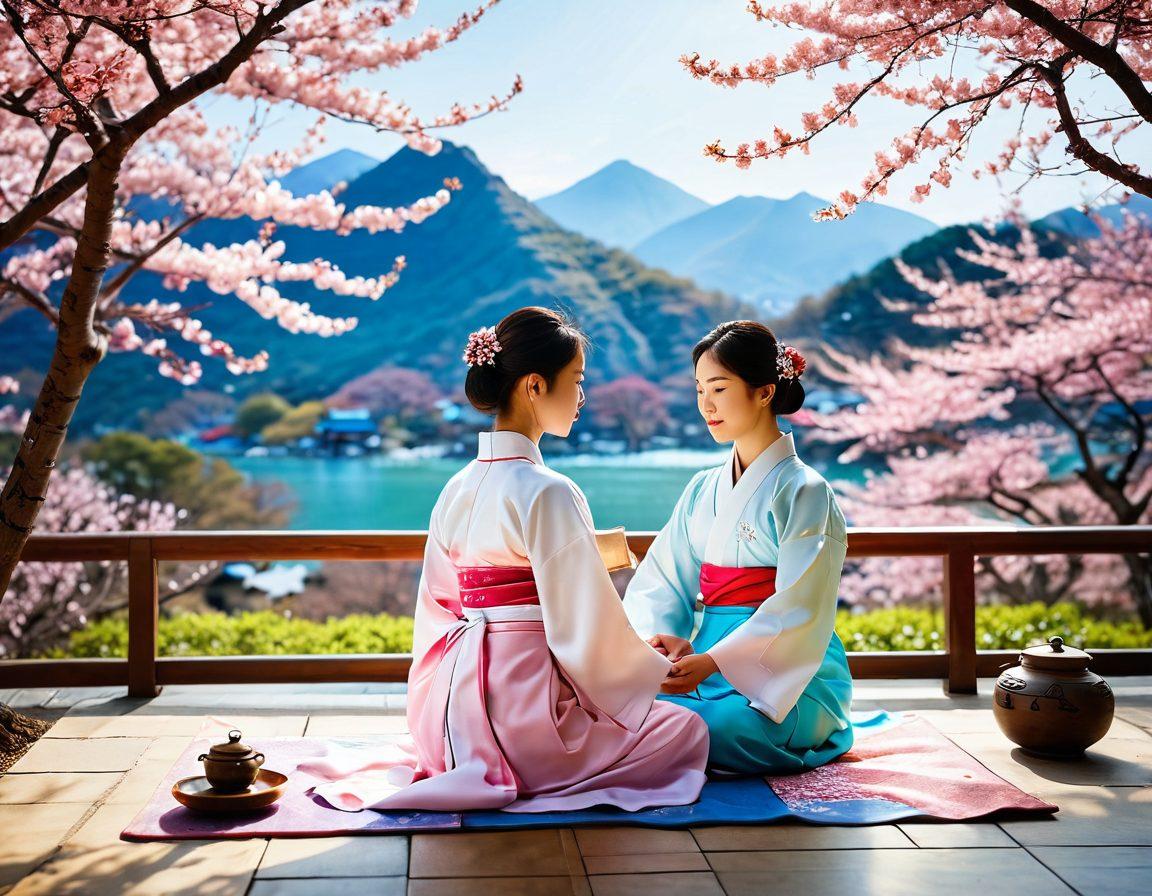Finding Joy: The Intersection of Korean Culture and Mental Well-Being
When we think of happiness, different cultures bring various flavorful ingredients to the emotional dish that sustains us. Korean culture, brimming with its rich traditions and unique practices, offers a feast of methods for achieving emotional resilience. But what exactly lies behind the pursuit of happiness in Korean culture? How can we unlock these age-old secrets to improve our own mental health? These questions lead us on a journey into the heart of Korean happiness, exploring their therapeutic techniques, community practices, and the psychology that drives emotional well-being.
In Korea, the interplay of tradition and modern psychology forms the backbone of their approach to happiness and mental health. From the ancient wisdom embedded in Confucian values to contemporary psychological studies on Korean emotional health, it's fascinating to see how these components harmonize. For instance, practices like 'Han' and 'Jeong' inform our understanding of emotional resilience—not just as individual traits but as deeply communal experiences. Konversations about Korean happiness research often highlight these terms, illustrating how collective support plays a role in nurturing positive emotional health.
Mindfulness in psychology is not just a Western innovation; it's a practice found in the fabric of Korean culture. Meditation, self-reflection, and community gatherings are respected forms of therapy in Korea that cultivate mental wellness. What if we adopt similar rituals in our lives? Perhaps by engaging in traditional Korean therapeutic methods, such as tea ceremonies or communal meals, we can create environments that prioritize well-being strategies and bolster our emotional well-being. The very heart of Korean therapeutic practices remains focused on holistic mental health, reminding us that happiness is often about connection, community, and shared experiences.
Perhaps one of the most beautiful aspects of happiness in Korean culture is its emphasis on the collective. The Korean term 'hyo,' which involves filial piety and respect for family, embodies how emotional resilience is nurtured through relationships and social obligations. Engaging in conversations around these cultural well-being practices encourages us to reflect on our own connections. What strategies can we implement to enhance our emotional resilience through family and friendship? As we navigate our modern lives, these reflections are invaluable, reminding us that community is not just a backdrop for our lives; it's an essential ingredient in our happiness.
In summary, unpacking the treasures of Korean happiness leads us to a treasure trove of techniques, ideas, and cultural norms that promote emotional resilience. The lessons learned from these practices reveal that happiness is not only about personal achievement but also about intertwining our lives with those around us, tapping into the vibrant support network that cultural psychology offers. As we strive for positive mental health, may we embrace the wisdom of Korean culture, inviting more joy and connection into our emotional landscapes. Are you ready to explore these techniques and implement them into your everyday life?
Mindfulness and Mental Wellness: How Korean Culture Shapes Positive Emotional Health
In our fast-paced world, finding peace of mind can feel like a daunting task, especially as we navigate the complexities of daily life. Mindfulness and mental wellness have emerged as critical dialogues across various cultures, but none encapsulate the essence quite like Korean culture. Known for its rich heritage and community spirit, South Korea has woven principles of mindfulness into its fabric, creating a unique approach to emotional well-being. So, how does the lush landscape of Korean culture contribute to emotional health, and what strategies can we adopt to enhance our own lives?
Imagine walking through a serene bamboo forest, where every step you take brings you closer to a deeper connection with yourself. This immersive experience mirrors the tenets of mindfulness in psychology, a beacon of hope for many seeking emotional resilience. Happiness in Korean culture is often linked to communal ties, rituals, and practices that emphasize the importance of staying present and connected. It’s fascinating to think about how Korean mental health traditions nurture emotional well-being through elements such as family gatherings, traditional tea ceremonies, and holistic mental health practices—each a gentle reminder that we are not alone in our struggles.
One might wonder: How can these age-old cultural wellness strategies resonate in our contemporary lives? In Korea, therapy is not merely an individual endeavor but a communal journey. The emphasis on relationships is rooted deeply in the philosophy of cultural psychology, fostering a sense of belonging that alleviates the burden of mental wellness. The therapeutic techniques employed in Korea often include conversation and shared experiences, allowing individuals to process their emotions while surrounded by supportive loved ones. This approach highlights how vital our connections are to achieving positive emotional health.
Consider the concept of 'Jeong', a term that encapsulates the warm bond between people. This idea beautifully illustrates how emotional connections can aid in building emotional resilience, aligning with findings from recent Korean happiness research. The combination of intentional mindfulness and community fabric creates an environment where positive mental health flourishes. Have you ever experienced a moment of pure joy surrounded by friends? That’s Jeong in action—a powerful movement in the realm of emotional health that we can all learn from.
Ultimately, while we may navigate different cultural landscapes, the core tenets of mindfulness and mental wellness remain universally relevant. By adopting cultural well-being practices inspired by Korean therapeutic methods—such as engaging in meaningful conversations, celebrating small victories, and practicing mindfulness in everyday activities—we can pave the way towards achieving holistic mental health. So why not take a step towards nurturing your own emotional well-being? Embrace the power of community and mindfulness, and unlock the door to a happier, healthier you.
Cultural Psychology and Joy: Strategies for Thriving in Korean Society
In the colorful tapestry of life, happiness often seems like the elusive butterfly we chase, especially in the fast-paced realm of modern society. For many in Korea, the pursuit of joy is intricately woven into the fabric of culture and community. Can we harness cultural psychology to enhance our emotional well-being? This question not only piques our curiosity but also opens doors to understanding happiness in Korean culture through unique strategies that cater to the nuances of its society. As we explore the intersection of cultural practices and psychological happiness, we find ourselves equipped with tools that can foster positive mental health, not just for ourselves, but for our entire community.
The essence of happiness in Korean culture is deeply rooted in relationships and shared experiences. Picture a bustling Korean barbecue, where laughter mingles with the aroma of sizzling meats. It's not just a meal; it's a celebration of connection. Reflecting on these moments brings to mind a powerful quote: 'Happiness is best when shared.' This sentiment captures how communal gatherings are significant in strengthening emotional ties, fortifying our emotional resilience. By embracing these cultural well-being practices, we nurture our mental wellness, encouraging others to do the same – a cycle of joy that enriches everyone involved.
Delving deeper into Korean therapeutic methods reveals innovative strategies grounded in mindfulness in psychology. Imagine a bustling city like Seoul, where the chaos of urban life can strain emotional well-being. Here, therapy in Korea often incorporates traditional practices like meditation and mindfulness, which are not just buzzwords but transformative approaches to achieve holistic mental health. Whether it is through mindful breathing techniques or engaging in nature walks, these practices provide practical ways for individuals to manage stress and cultivate positive emotional health. Have you ever considered how such techniques could play a pivotal role in your life?
Korean happiness research consistently highlights the importance of community support, further emphasizing the connection between cultural psychology and emotional well-being. Consider the idea of family as a support network—a concept that transcends generations and becomes integral to one's happiness. In Korean society, the practice of confiding in family or close friends plays a crucial role in maintaining one's mental wellness. The simplicity of 'let's talk about it' can often be the first step in the journey toward emotional health. Isn’t it fascinating how the art of conversation can be a powerful therapeutic technique?
As we reflect on these insights, it becomes clear that the strategies embedded in Korean culture are more than traditions; they are pathways to thriving emotionally in a demanding world. From understanding Korean psychological studies to embracing well-being strategies rooted in connection and mindfulness, there is so much to gain. So, how will you introduce these culturally rich methods into your daily life? Perhaps it's time to create your own 'Korean-style' gathering, integrating community and connection as the heart of your happiness journey. Let's celebrate joy together, reflecting not only on its impact on our lives but also on the lives we touch along the way.


